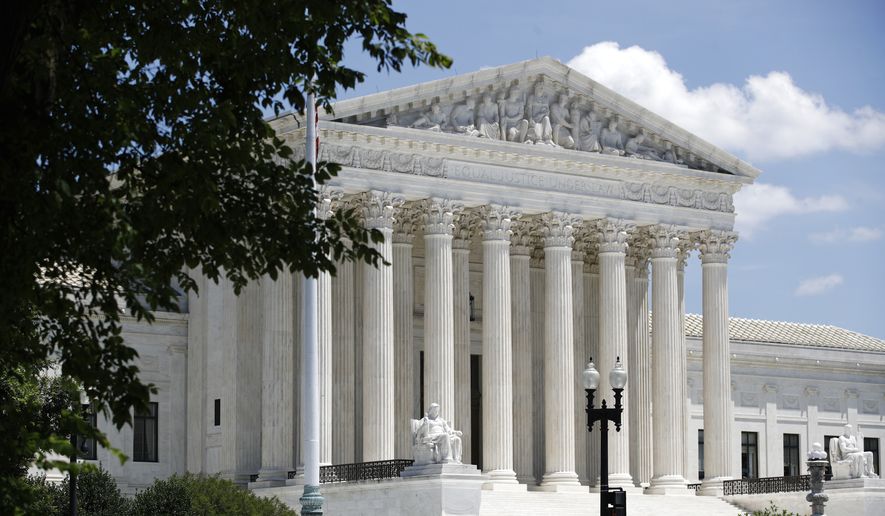Justices on the Supreme Court are more vocal than in prior decades as partisan discord rises, but court watchers are split on whether the justices should bow to pressure and weigh in on the political quarrels over their rulings.
Chief Justice John G. Roberts Jr. rebuked President Trump’s characterization of “Obama judges” in 2018. Last month, he denied he had issued a mask mandate after reports that Justice Sonia Sotomayor was frustrated that Justice Neil M. Gorsuch was not wearing one. Still, the Roberts court isn’t shying away from controversy.
Some associate justices have tried to defend their work and insisted they are not swayed by partisan concerns when issuing rulings and dissents. Liberal politicians had escalated criticisms of the conservative majority on the bench and threatened to add more justices to the court.
“The justices are talking far more about the court now than they did in the past. I think these remarks are an attempt to address increasingly partisan rhetoric,” said Josh Blackman, a professor at South Texas College of Law who disapproves of the outspokenness. “The court is responding to pressure, and I think this trend is unfortunate. The justices should stick to their business.”
Others welcome the commentary. Elliot Mincberg, a senior fellow at People for The American Way, said more transparency is good.
“More is better than less,” he said. “We know they have views. We know they share them with each other. Why not with the public too?”
A Supreme Court spokesperson said an official count of public statements and speeches by the justices is not available, but court watchers and reporters are hearing more from the justices outside the courtroom.
The justices with more experience and time on the court seem to have more public appearances scheduled, said Gabe Roth, executive director of Fix the Court.
“I think it’s incredibly important for the public to see and hear from the leaders of the judiciary as often as their schedules permit, and these speeches should always be open press, with a livestream made available to the public,” he said.
Justice Sotomayor warned in remarks at New York University last week that she sees a potential “crisis” as politicians and media question the legitimacy of the court.
“As norms in the nomination process are broken, as more senators, congressional representative governors, mayors, local politicians and media question the legitimacy of the court, many of them heap scorn on the court,” she said. “The threat [to judicial independence] is greater and unprecedented than at any time in our history.”
The Obama-era high court appointee also warned that increasingly partisan Supreme Court confirmation battles could jeopardize the judiciary’s independence by feeding voter concerns about fairness and impartiality.
“It certainly does feed into the public’s uncertainty. And that has a price,” she said. “The more partisan the voting becomes, the less belief that the public is likely to have that Congress is making a merits- or qualifications-based assessment of judicial nominees.”
Offering a defense
Other associate justices have also taken time to defend their colleagues’ work.
Justice Amy Coney Barrett insisted in September that she and her colleagues do not make rulings based on political views.
“My goal today is to convince you that this court is not comprised of a bunch of partisan hacks,” Justice Barrett said, according to the Louisville Courier Journal. “Judicial philosophies are not the same as political parties.”
Justice Stephen G. Breyer, who announced his plan to retire this year, warned against expanding the court. He said politicians should think hard before going down that road.
“If the public sees judges as politicians in robes, its confidence in the courts — and in the rule of law itself — can only diminish, diminishing the court’s power, including its power to act as a check on other branches,” Justice Breyer said during a speech last year.
Curt Levey, president of the Committee for Justice, said the notion that justices have been more vocal in recent years could be because the “cultural prohibition against [speaking out] has weakened” — meaning judges can speak more freely — or that they feel compelled to respond to the increasing politicization.
“It was certainly very helpful [that] Breyer spoke out against court-packing,” Mr. Levey said. “It is helpful for the justices to all be on the same page and say, ‘Look, we don’t want to be seen as political, and we are basically doing our best not to’ — and I think there is a lot of truth to that.”
Carrie Severino, president of the Judicial Crisis Network, said threats from politicians such as Senate Majority Leader Charles E. Schumer, New York Democrat, have spurred the court to respond. In 2020, Mr. Schumer, then the Democratic minority leader, stood on the steps of the Supreme Court rallying pro-choice supporters against two of Mr. Trump’s appointees when the court was hearing an abortion-related case out of Louisiana.
“I want to tell you, Gorsuch. I want to tell you, Kavanaugh. You have released the whirlwind, and you will pay the price. You won’t know what hit you if you go forward with these awful decisions,” he said at the time.
“The justices shouldn’t be voting in cases because they are worried about those kinds of threats,” said Ms. Severino, noting that judges can do little to defend themselves.
“That is the challenge the court has found itself in,” she said.
• Alex Swoyer can be reached at aswoyer@washingtontimes.com.




Please read our comment policy before commenting.